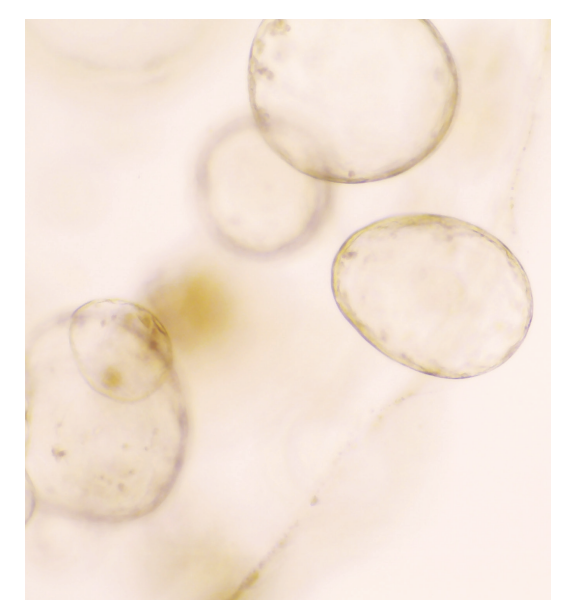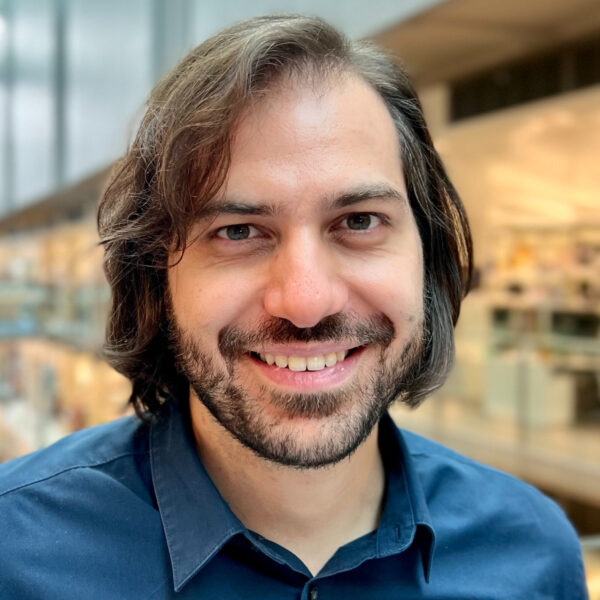Evangelos Giampazolias
Cancer Immunosurveillance Group Leader
Evangelos is a Cancer Immunologist and Junior Group Leader at the CRUK Manchester Institute where he heads the Cancer Immunosurveillance group. His lab focuses on understanding the interactions of host cells with commensal microbes or damaged cells that enable the immune system to mount a response against cancer. His ultimate vision is to identify novel immune checkpoints that will be predictive of immunotherapy response and can be targeted to overcome therapy resistance in cancer patients.
About Dr Evangelos Giampazolias
Evangelos Giampazolias received his BSc in Chemistry (2009) and MSc in Clinical Biochemistry (2012) from the University of Athens in Greece. In 2012, he moved to Glasgow, UK, for his PhD at the CRUK Beatson Institute (now the CRUK Scotland Institute) under the supervision of Professor Stephen Tait to study cell death modalities that are controlled by mitochondria as anti-cancer therapies. During his PhD, he discovered the pro-inflammatory signals that accompany caspase-independent cell death as potent instigators of anti-cancer immune responses. For this, he was awarded the Institute of Cancer Sciences Prize (2017) and the CRUK Pontecorvo Prize (2018).
Evangelos subsequently joined the group of Professor Caetano Reis e Sousa at The Francis Crick Institute in London, UK, as a Postdoctoral Fellow, to study how detection of dying tumour cells by antigen-presenting cells elicits immunity to cancer. There, he identified that the plasma actin-binding protein secreted gelsolin dampens dendritic cell-mediated cross-presentation of dead cell-associated antigens to T cells hijacking cancer immunity. He was granted an innovation patent (2020) to explore potential therapeutic targets from his findings as novel immunotherapy for cancers. Further to this, Evangelos developed an interest in understanding how the gut microbiome influences cancer immunity.
In 2023, Evangelos established the Cancer Immunosurveillance group at the CRUK Manchester Institute, which focuses on the characterisation of the mechanisms that enable the immune system to recognise and respond to cancer through integration of cues that are elicited by dying cells and commensal microbes. During the transition to his Group Leader position, he demonstrated for the first time that the ability of the gut microbiome to instruct immune responses to extraintestinal cancers depends on the host availability of a single micronutrient, vitamin D. In 2024, Evangelos was awarded an ERC Starting Grant to study how nutrient-host-microbiome interactions define immunity to cancer. His group is additionally funded by Cancer Research UK Institute Award and Royal Society Research Grant.
Groups
Qualifications
- PhD in Cancer Studies (Cancer Cell Death) | 2017 | CRUK Beatson Institute, University of Glasgow
- MSc in Clinical Biochemistry | 2012 | University of Athens, Greece
- BSc in Chemistry | 2009 | University of Athens, Greece
Interests
- Cancer Immunology
- Immunobiology
- Host-Microbiome Interactions
- Cell Death Sensing
Research Projects
Publications
Why I work at CRUK MI
“The CRUK Manchester Institute (CRUK MI) is encompassed in a world-class scientific environment together with its research partners: The Christie Hospital – one of the largest and leading oncology centres in Europe – the Division of Cancer Sciences and Lydia Becker Institute of Immunology and Inflammation (University of Manchester). Being at the centre of cancer and immunology research in the UK, CRUK MI consistently translates basic knowledge to the clinic, which, together with the support of its cutting-edge facilities is at the foreground of groundbreaking discoveries.”
Visit Research Group
We have previously shown that immune detection of dying tumour cells can elicit anti-cancer immunity. We have characterised the mechanisms that couple recognition of dead-cell-associated signals to CD8+ T cells responses and identified molecules of the host that act as natural barriers to immune-mediated detection of dying cancer cells, inhibiting cancer immunity. We have further shown that the interaction of dying cancer cells with the immune system is necessary, but not sufficient, to elicit cancer immunity due to the requirement of immunologically permissive environments dictated by the gut microbiome. Specifically, we have found for the first time that the ability of microbiota to instruct immune responses to cancer depends on the host availability of a single micronutrient, vitamin D, and is not an inherited property of the commensal species’ origin.
We build on our recent discovery and address critical open-ended questions in the field of microbiome-immune interactions in cancer: (1) How do we define a “good” microbiota that promotes immunity to cancer? (2) How do commensal species interact with host cells to promote cancer immunity? (3) Can we harness microbiome-immune interactions to prevent cancer development and progression as well as predict therapy response? Our programme of work diverges from a species-centric view of the microbiome and set a foundation for understanding how nutrient-host-microbiome interactions define T cell-mediated immunity to cancer and immunotherapy success; an enigma yet to be solved. Our ultimate vision is to contribute to the basic understanding of cancer immunity and pave the way for therapeutic interventions.
All Institute Publications
https://doi.org/10.1016/j.ccell.2025.04.001
Stromal lipid species dictate melanoma metastasis and tropism
24 April 2025
Institute Authors (5)
Amaya Viros, Duncan Smith, Garry Ashton, Alex Baker, Tim Somervaille
Labs & Facilities
Biological Mass Spectrometry, Histology, Visualisation, Irradiation and Analysis
Research Group
Skin Cancer & Ageing
24 April 2025
https://doi.org/10.1038/s41467-025-58343-y
A human model to deconvolve genotype-phenotype causations in lung squamous cell carcinoma
4 April 2025
Institute Authors (4)
Carlos Lopez-Garcia, Robert Sellers, Sudhakar Sahoo, Caroline Dive
Labs & Facilities
Computational Biology Support
Research Group
Translational Lung Cancer Biology
4 April 2025
https://doi.org/10.1186/s12943-024-02157-x
The PI3K-AKT-mTOR axis persists as a therapeutic dependency in KRASG12D-driven non-small cell lung cancer
12 November 2024
Institute Authors (1)
Amaya Viros
Labs & Facilities
Genome Editing and Mouse Models
Research Group
Skin Cancer & Ageing
12 November 2024
https://doi.org/10.1186/s13045-024-01610-0
The small inhibitor WM-1119 effectively targets KAT6A-rearranged AML, but not KMT2A-rearranged AML, despite shared KAT6 genetic dependency
8 October 2024
Institute Authors (6)
Georges Lacaud, Mathew Sheridan, Michael Lie-a-ling, Liam Clayfield, Jessica Whittle, Jingru Xu
Research Group
Stem Cell Biology
8 October 2024
/wp-content/uploads/2024/11/Annual-Report-2023.pdf
2023 Annual Report
13 September 2024
13 September 2024
https://doi.org/10.1126/science.adh7954
Vitamin D regulates microbiome-dependent cancer immunity
25 April 2024
Institute Authors (3)
Evangelos Giampazolias, Maria Koufaki, Santiago Zelenay
Research Group
Cancer Immunosurveillance
25 April 2024





